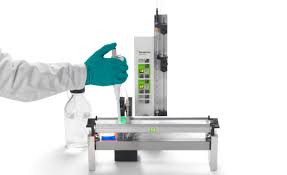Efficiency is crucial in the ever-changing field of scientific research and analysis. Every discovery and every breakthrough depends not only on the intelligence of the people who made it but also on the resources available to them. The introduction of Automatic Sample Dilution Systems (ASDS) has quietly brought about a revolution in laboratory operations across the globe in recent years.
These systems mark a revolutionary technological advance that is changing the nature of research, not just small, incremental advancements. Examine how the game is being altered by these systems.
Accuracy and Precision
The automatic sample dilution system changes the way science is done by getting rid of the errors that come with human sample dilution. This makes sure that the results are always accurate and precise. ASDS reduces the chance of mistakes made by humans that come with traditional methods by automating the whole dilution process and strictly following set parameters.
This level of accuracy is used for the whole dilution process, from counting the number of samples to figuring out the reduction ratios. So, researchers can be sure of reliable results whether they are doing high-throughput assays or single-sample studies.
Efficiency & Time-saving
In the scientific community, time is a valuable resource. Manual dilution procedures can be time-consuming and labor-intensive, using valuable resources that could be used in other ways. By streamlining this procedure, ASDS enables researchers to concentrate on more intellectually challenging parts of their work by automating repetitive processes.
What used to take hours may now be completed in minutes, which speeds up research and promotes creativity.
Adaptability and Personalization
In science, one size does not fit all. Certain dilution ratios are frequently needed for experimental techniques, depending on the sample’s characteristics and the analytical method being used. Because of ASDS’s unmatched versatility, researchers can easily change the dilution parameters.
These systems enhance laboratory agility and adaptability, allowing researchers to swiftly adjust to evolving experimental requirements, such as changing volume ratios, dilution factors, or sample types.
Traceability and Integrity of Data
It is imperative to ensure data integrity in the era of data-driven science. The integrity of experimental data may be jeopardized by transcription errors and documentation problems that can occur during manual dilution procedures. To overcome this difficulty, ASDS offers a digital record of each dilution stage, guaranteeing total traceability from sample preparation to analysis.
These systems improve repeatability and regulatory compliance by automating data collecting and recording.
Economy of Cost and Resource Allocation
Efficiency involves more than just time savings; it also entails resource optimization. Operational costs are increased by the frequent need for excessive reagent and consumable consumption in manual dilution procedures.
By accurately distributing the correct amount of reagents required for each dilution step, ASDS minimizes waste and lowers total costs. Additionally, these solutions help laboratories optimize human capital and boost operational efficiency by relieving staff of tedious chores.
Connectivity and Integration
The secret to realizing the full potential of laboratory automation in the linked world of today is smooth integration. By integrating ASDS with already-in-use lab equipment and data management platforms, a cohesive process from sample preparation to data analysis is produced.
Integrating with LIMS (Laboratory Information Management Systems) improves cooperation and communication both inside and across research teams by making sample tracking and result reporting easier.
Applications Across Industries
Automated sample dilution systems have changed many fields by simplifying processes, making them more accurate, and making them more efficient overall. You can learn more about how these tools are changing technology in many different areas here.
Pharmaceutical and Biotechnology Sectors
Automatic sample dilution devices are very important in the pharmaceutical and biotechnology industries for developing, making, and testing drugs. These methods make sure that the dilution ratios are exact, which is important for keeping batches consistent and meeting government standards.
Pharmaceutical businesses can speed up research and development while still making sure the quality and effectiveness of their products by automating this important step.
Environmental and Chemical Analysis
In labs that do chemical and environmental research, automatic sample dilution systems are a must. They make it possible for researchers to concentrate and study samples more accurately and quickly than ever before.
These systems make sure that measurements are always the same, which makes it easier to follow science and environmental rules. They can be used to check for pollutants in water or to figure out what chemicals are in complex mixtures.
Food and Beverage Industry
Automatic sample dilution systems are very important in the food and drink business for keeping products safe and of high quality. These systems make quality control easier by testing everything from raw materials to finished goods to make sure they are all the same.
They help companies find contaminants, check the amounts of ingredients, and follow strict cleanliness and safety rules, which protects the health and trust of consumers.
Embracing the Future: Harnessing the Power of ASDS
The introduction of Automatic Sample Dilution Systems has revolutionized laboratory automation, pushing the boundaries of accuracy, creativity, and efficiency. These devices enable researchers to concentrate their time and skills on what matters—improving scientific understanding and expanding the frontiers of discovery—by automating time-consuming sample dilution procedures.
ASDS is at the forefront of technological advancements that are transforming research methodology and influencing the direction of science.

